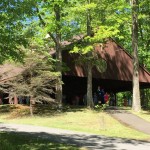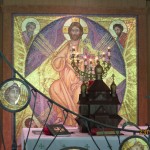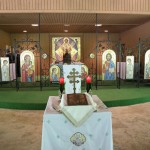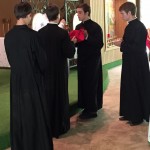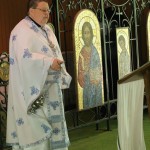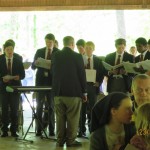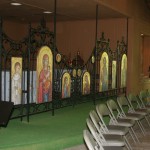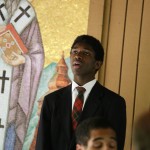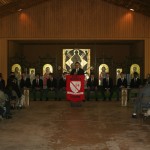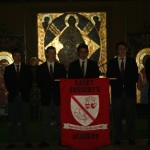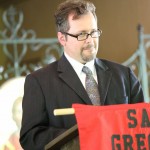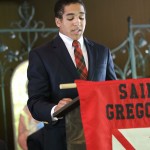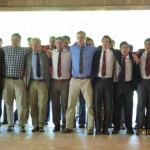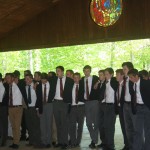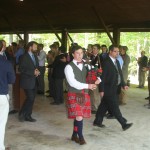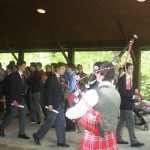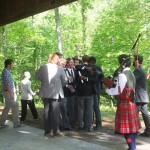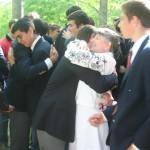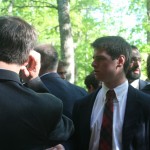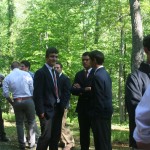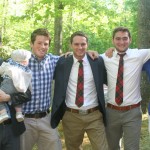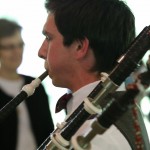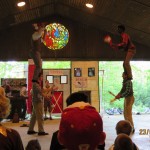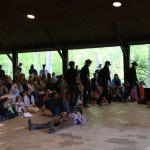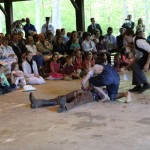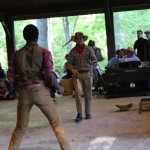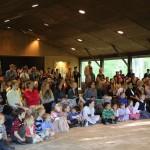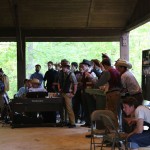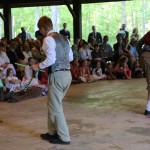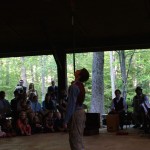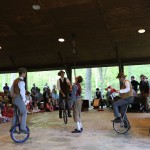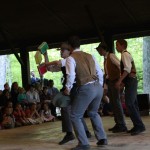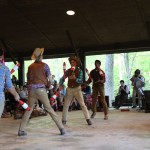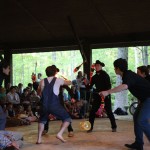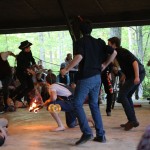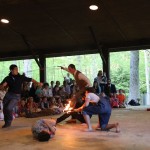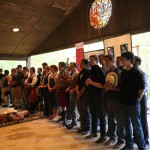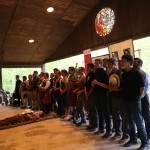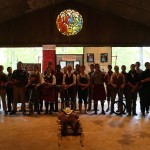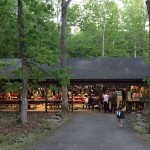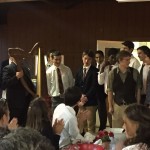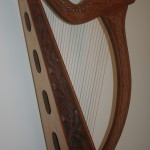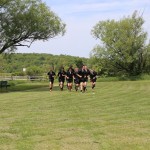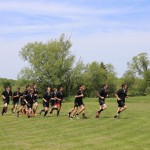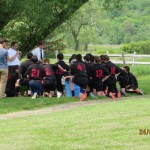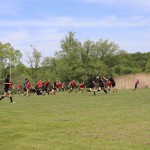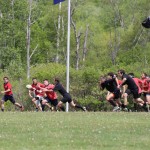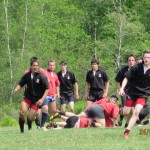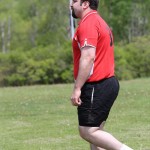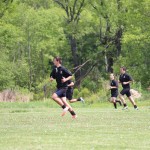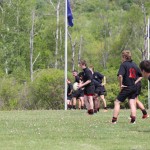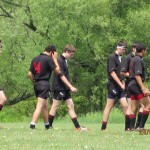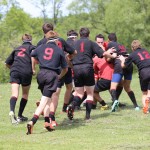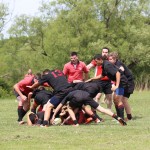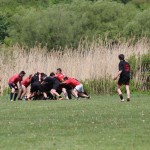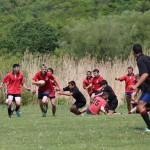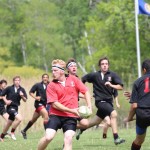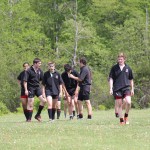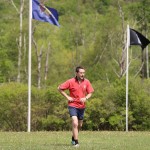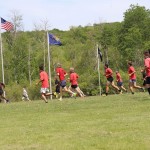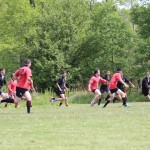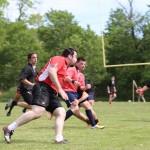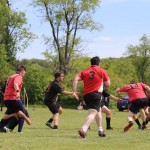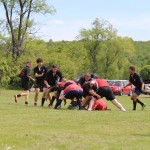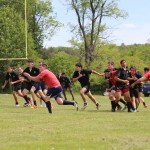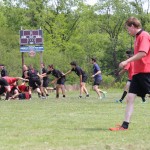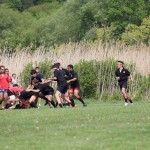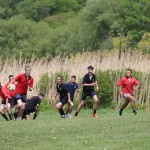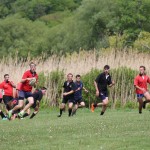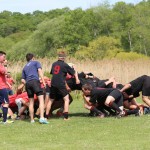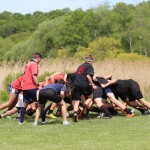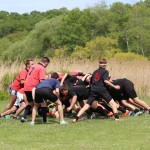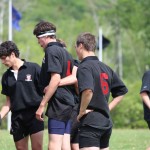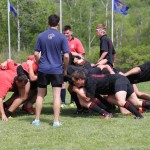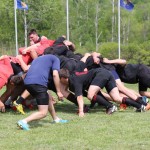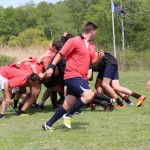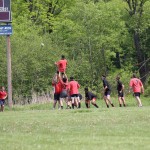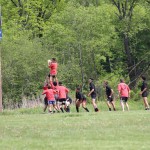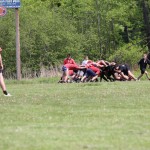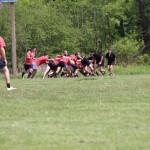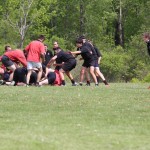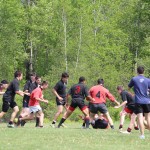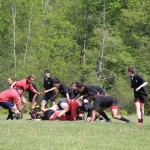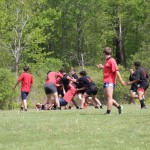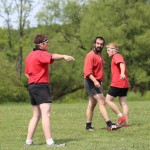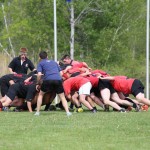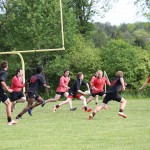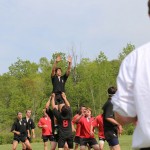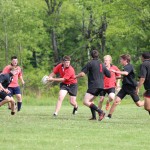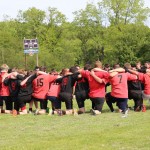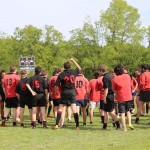Author: admin
2015 Valedictorian Address
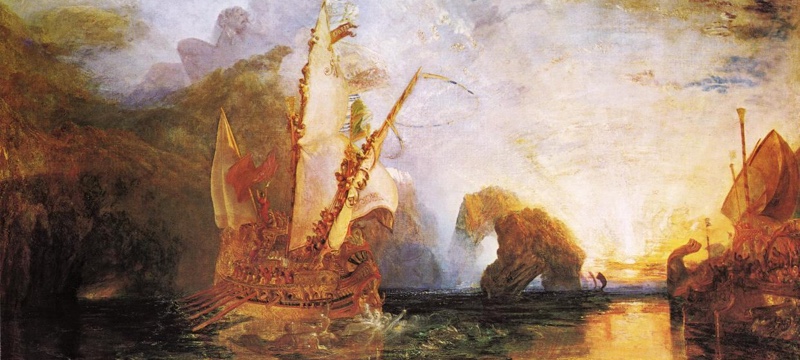
Reverend Father, Guests, Teachers and Dorm Fathers, Alumni and Students:
Thank you for being here for the graduation of the class of 2015 from Gregory the Great Academy. I have never given a speech before, so I am a little uncomfortable. Actually, I would probably be more comfortable if someone threw me a rugby ball and I had to charge through all of you, score a try, and call it a day. But since that would probably make you uncomfortable. So I think I’ll just stick to the plan and do my best with the speech. I would like to begin with a poem, one of the first poems I learned at St. Gregory’s. It is called “The Rainbow”:
My heart leaps up when I behold
A rainbow in the sky.
So was it when my life began,
So is it now I am a man,
So be it when I shall grow old,
Or let me die!
The Child is father of the Man,
And I could wish my days to be
Bound each to each by natural piety.
I think it is fitting that this poem I just recited should be the last poem I recite as a student of Gregory the Great Academy. When I walked up this aisle a few moments ago, I came up as a student with my class. In a few moments more, I will walk back down with my class, but I won’t be a student of this school anymore. I am moving on, together with my friends, to different days, to a different life; and this poem resonates with the passing of time—and I refer both to the passing of the days and the maturing of the mind. Good poetry, I am told, only gets better with time, and I know it is true with this poem. It has always been a guide to me through my times at St. Gregory’s. It has taught me what this school is about, and helped me learn from this school not only how to become a man, but also—and more importantly—what kind of man I should become. “The Rainbow” is a poem about the journey from childhood to manhood, and so has it kept me on course as I undertook the journey of St. Gregory’s.
Gregory the Great Academy is a journey—a journey that in many ways embodies the epic tales we love to read and that inform the way we look at our lives and the world around us. This pilgrimage is not always as grand or elaborate as the wonders chronicled in Homer’s Odyssey; however, it shares in similarly life-changing experiences and adventures. Just as Odysseus’ goal was to reach his home, so too is it our goal as students to finish the course and return home. But we learn from Odysseus that he cannot reach home until he has been changed in some significant way. He must return to Ithaca as a new man, having put aside his profession as a sacker of cities on the windy plains of Troy. Similarly, as students, we cannot leave until we have been affected in some way by this school—until we have become stronger by bearing up under challenge; until we have learned to live and to love no longer as boys, but as men. Every student’s experience of Gregory the Great is different. To some, the journey may seem as long and treacherous as the trials of Odysseus. Rugby practice may seem as daunting as fighting the stallion-breaking Trojans; and studying as terrible as having your brains dashed out by the Cyclops. I don’t think anyone thinks of our school as Calypso’s island, at least—which is probably a good thing. Others might relate more to the journeys of Telemachus who had a short, simple voyage to learn more about himself, the world around him, and the man he was called to become until he returned home, like his father, Odysseus, a changed man—no longer a boy. Whether someone has the experience of Odysseus or Telemachus, the person—the Child—is changed for the better for embarking on this journey. The whole point is that St. Gregory’s provides a mold for manhood by giving the young the experience of hardship—both its rigors and its rewards.
This is the essence of the education we receive here, and it is also the essence of a true faith—to come home to ourselves both physically and spiritually.
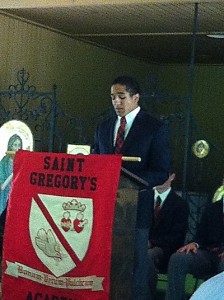
My journey began, as most journeys do, at the beginning. But, like a true epic, it also began in medias res, “in the middle of things,” for I found myself suddenly on board with a hardy crew that was already underway on a great adventure, and I was fortunate enough to be given a space on the bench and an oar to pull with. I came to St. Gregory’s as a freshman in 2011. At that time, I knew nothing about St. Gregory’s except the legends that my brothers had told me. It wasn’t till about a month into the school year that I began to see what St. Gregory’s was about. In my freshman literature class, I learned a poem called “The Rainbow” by William Wordsworth. After I learned this poem by heart, and Mr. Fitzpatrick shared some of its secrets with me, I began to see what kind of adventure I was getting into. I learned from this poem that the “Child is father of the Man:” that what we do in our youth affects the men we will become, the men who will be born out of our childhood. My quest at St. Gregory’s was not one for a golden fleece or a golden city, but for manhood. St. Gregory’s fathers men from boys. What kind of men I didn’t know when I first set out, but I knew I would find out at the end of my journey—when I would myself become a man.
There were, of course, some dark stretches in my journey—a descent into the underworld, you might say, after the good ship went down in 2012. But the crew of St. Gregory’s survived Scylla and Charybdis and mustered again at a new port. St. Gregory’s rose again to new life, reborn to carry on its quest. The spirit of St. Gregory’s is not confined to a building, as we have seen. The spirit of the wanderer is hard to drown beneath the gulfs. Our school is much more than a building, just as a voyage is much more than a ship. Other vessels can be fashioned so long as the crew’s purpose holds to sail beyond the sunset and the baths of all the Western stars. We have not yielded. The rainbow returned after the storm. The adventure goes on.
I could tell you all the beautiful poems we have studied and memorized, and all the incredible books we have read. I could tell you about all the escapades we have gone on singing and juggling in New york, all the strange and interesting people we have met, on our Scranton adventures, and all the things that have affected me in little and large ways that helped to form me. But that would take four years to tell. I will, however, tell you the end result; what I have found after striving and seeking over these four years: the men of St. Gregory’s are men with a sense of duty, a sense of responsibility—young men who are able to give the right response at the right time—whose hearts leap up when they behold the miracles of our God; men who know when to rejoice, and when to be serious; men who know when it is good to act like boys and when it is good to act like men; young men who know what is sweet in life and what is terrible; men who are ready to go out into the world unafraid, confirmed and well armed by their experience of the good, the true, and the beautiful.
Although many of my classmates joined me mid-journey, as I, and all of us for that matter, joined the school in the middle of its journey, we have all undertaken the same course together, and together we have listened to and followed the truth of the poem, “The Rainbow.” The children we were at the beginning have become men at last. We set out on a journey, and have been changed by the experience, by the adventure. May we keep the lessons and the loves instilled in us by St. Gregory’s when we shall grow old, or let us die. I thank God for this school, for this class of friends, and for our parents and teachers who sacrificed so much to give us these gifts. Now we depart on our own journeys, having been strengthened by this journey together, which is now coming to a close for us. We will never forget these adventures, and our hearts will always leap up when we recall these days of our youth and the birth of our manhood, and may it ever fill us with a natural piety, that love for things essentially lovable, that will push us ever onwards to whatever adventures lie in wait.
This speech was given on May 23rd, 2015 by Philip Gay, Valedictorian of Gregory the Great Academy’s Class of 2015.
Headmaster’s 2015 Graduation Address
![]()
Reverend Father, Honored Guests, Faculty and Staff, Alumni, Students, and Seniors:
I have been thinking for some time about this moment when I should address you all, and address these men. I thought that I should center my talk on some telling text, some profound piece of poetry, some scrap of Holy Scripture that might best exemplify these men. I rummaged about in my books and in my brain—and finally I unearthed something. But it was not what I expected. Ladies and gentlemen, this class is a good class, a class of men—and my words to them will, in fact, turn on a very venerable literary tradition: the story of the Three Little Pigs and the Big Bad Wolf. What’s so funny? It’s a very good story, and I would remind you that there is a lot of death in it! Have some respect. If you think the material unbefitting a good senior class—a class of graduates, a class of men—allow me to here huff and puff a few words. You’ll see.
A few words on this fine day and to these fine men, as we here dismiss them from Gregory the Great Academy. Now, I bet some of you think that you see where this is all going. Just as Old Mother Pig dismissed her sons into the wide world to seek their fortunes and strive against wolves who would devour them, you may think I am going to dismiss these pigs here and wish them luck on the moral battlefield, encouraging them to build brick walls around the precious hairs of their chinny-chin-chins. Not so fast. This dismissal is not that simple. (Just wait for the pigs—they’ll come in at the right moment.) I say “dismiss,” it is true, and like Old Mother Pig, there is sadness is this dismissal, for we are losing a great company on this day. And it is to these lads, these hearts, that I offer this dismissal and these words.
There are many words that are more than mere words. Many of the words of the Divine Liturgy are such, being laden with a power and a purpose that flies far beyond immediate meaning. Some command miracles, such as the words of consecration. Others command missions, such as the celebrant’s dismissal when the Mass concludes. The end of every Mass is intended as a beginning. The word, “Mass,” is derived from the word “dismissal,” which is rooted in the image of many people being sent forth upon different ways on a common mission. The priest’s dismissal is a restatement of Christ’s dismissal to His apostles prior to His glorious Ascension which we celebrated last week: a command to those who were sent forth, who were dismissed. “Ite; Missa est.” “Go; it is the dismissal.” “Go therefore and make disciples of all nations.” This selfsame “Go, you are sent forth” is spoken not only to apostles—to priests and bishops—but also to those who have become disciples. Seniors, you have become disciples, but you are not called to be disciples only. By your discipleship, you are all sent forth. You are all apostles. And there are twelve of you, after all.
You are all apostles. Seniors, I ask you, I exhort you, to take this truth with you from Gregory the Great Academy. It is an enormous truth—so big it is hard to see, like a hillside. I will not be able to bring it into full view, or do it any real justice in this talk, but I am happy to introduce the mystery to you—which is more or less my entire teaching style. I don’t really know what this is, but it is very real, and very important. Well, good luck climbing that hill. It should take you a lifetime. Hopefully a little less—so you can enjoy the view from the top for a little while. So with regard to your apostleship, seniors, let me get you started with the climb. The whole Church is apostolic because she remains in communion to Jesus Christ through the successors of the original apostles, and she is sent forth into the world. Every member of the Church, all of you and all of us, whether priest or layman, shares in this mission to be a missionary. Every Catholic has a mission to preach and teach the Gospel—to proclaim the Gospel by living the Gospel. All are sent forth under different degrees of holy orders as witnesses. Every vocation that serves Christ is an apostolic vocation, for an apostolate is nothing more than the activity of the Mystical Body of Christ.
Seniors, you are all a part of that Body. Your union with Christ, Who was sent by the Father for all of you, gives the name of “apostle” to you so long as you follow openly and freely in His grace and love. As St. Paul writes in his letter to the Romans, “For as in one body we have many members, and all the members do not have the same function, so we, though many, are one body in Christ, and individually members one of another.” All Catholics are apostles insofar as they are disciples, and as such, participate in the source and soul of the Church’s whole apostolate. Though honor must not be taken from those who carry the torch of the Apostles through the sacrament of Holy Orders, there is a priesthood of the people that participates in the one priesthood of Christ. From the Catechism: “The whole community of believers is, as such, priestly. The faithful exercise their baptismal priesthood through their participation, each according to his own vocation, in Christ’s mission as priest, prophet, and king. Through the sacraments of Baptism and Confirmation the faithful are ‘consecrated to be… a holy priesthood.’”
Seniors, follow the Apostles as apostles yourselves, heeding the call to action that ends every Mass, and carry the word—and the Word—further by Catholic example, Catholic joy, and Catholic peace. As mature Catholics and as graduates of St. Gregory’s you are called to transition from adherent to ambassador. And you have at your beck and call secrets that the world has largely forgotten. You have a sense of community, of brotherly love. You have a taste for beauty as you found it in the good and great works. You have music. You have poetry. You are jongleurs. You have been invigorated with many good things. Go, and invigorate others. You have been given gifts that are to be shared. Do not bury the goods entrusted to you. Multiply them. Wield your weapons of hope and mirth with a crusader spirit and bring new faces and friends into your ever-widening circle—and, as good clowns of God, keep Christ as your ringmaster.
Realize this: the mission to preach the Good News was not completely realized by Christ’s earthly life. It was left to His Apostles to carry on. “As the Father sent me, so I also send you… teach ye all nations.” Testifying to the truth cost Christ His life, and the Apostles would find the way similarly fraught with opposition. But as the Spirit sustained Our Lord through His Passion, so too the Spirit Who had spoken through the prophets does not leave the soldiers of Christ unaided. As King of Prophets, Christ foretold the Spirit’s coming: “Take no thought how or what to speak; for it shall be given you in that hour what to speak. For it is not you that speak but the Spirit of your Father that speaketh in you.” That promise was fulfilled on Pentecost, manifested in fire, wind, and earthquake. This was the enflaming of the infant Church into full manhood, full apostleship, inspiring the brave and joyful promulgation of the Gospel. This is the character of those confirmed in Christ, and it is the character indelibly sealed upon your souls as by a fire. It is a character that applied not only to the Twelve, but to you twelve as well—and it is not for the faint of heart to bear. In our little community, we always taught that you should never be afraid of being penalized for telling the truth. Outside of St. Gregory’s, you must expect punishment in exchange for truth, but you still must not be afraid. “Blessed are ye when they shall revile you and persecute you and speak all that is evil against you, untruly, for my sake. Be glad and rejoice.” For every Christian, for every one willing to suffer blows for Him Who suffered blows for us, for all of you, the same outpouring of the Spirit is bestowed for courage and confidence in the task of being a holy witness and a holy militant prepared to combat the enemies of the Faith.
Are you ready?
You are more ready than you know. You are called to a mission. You are called to evangelize. You are called to participate in the conversion of nations. If you don’t know where to begin, know that you have already begun. When I say you are all apostles, I do not merely mean that from this time forth you are sent forth as such, but I mean that you are apostles now. You have all become apostles at St. Gregory’s. Our little school is able to bestow large lessons—even transformations. Seniors, you have all undergone the passage from discipleship to apostleship as a student. You have matured from follower to forerunner. You have experienced the challenge that you must now enact in a larger world and on a larger scale, but it is the same challenge—the challenge to love well and lead well. You are more ready than you know, and the signs are both strong and subtle that point to your readiness.
And this is where the pigs come in. Once upon a time, there were nine little freshmen, who were given the task by the dean of composing a class skit for the all-school talent show on Saturday night. They put their heads together, but their heads were like nine empty bowls with not a pea to roll about between them. Meanwhile, in another part of the school, there were twelve tall seniors who had just returned from the hard and heavy task of moving house for the family of an old alumnus of their school. They were tired. But the dean called them in, saying, “Go, and seek you out the other classes who are scattered hither and yon preparing for the great talent show, and see to it that they are preparing goodly entertainments for tonight’s revels.” (That is the way that deans always talk.) So the seniors went along, each in their own way, to check on the progress of the performances. One of these seniors was named Philip. He came upon the nine freshmen, still holding their poor heads together, and asked them what was toward. One of the freshmen meekly responded that they had no good idea for the talent show and had therefore decided upon a bad idea: namely, and for shame, a metronomic mantra of nihilistic high-voltage street culture, commonly known as “rap.” Philip heard this and his great face remained unchanged, like a stone. “That is foolish,” said he. “You will not do that.” “Whatever shall we do then?” cried the freshmen. Philip’s face flickered, like a fire. “The story of the Three Little Pigs,” said he. “That is what you will do.” The freshman fingered their heads. “We will do this play,” they said, “but only if you will do it with us, for we cannot do it alone.” “I will do it with you,” said Philip. “You will not be alone.” And so it was done. And by the hairs of my chinny-chin-chin, a very fine skit it was. According to the dean, it was the shining centerpiece of one of the greatest talent shows in the vast and varied talent-show history of our school, and one to be remembered and revered for posterity. (That is the way that deans always talk.)
Seniors, you are leaders already. Continue leading in charity. Stand upright. Swim against the tide. Boil wolves over your fires. Make people happy. Call evil, “evil,” the good, “good,” and, as Mr. Gay did, the foolish, “foolish.” Reflect without shame or hesitation what Christ taught, for what Christ taught is true. All beliefs are not equal because there is only one truth, and do not be shy to say it plainly like a man. Americans are too used to regarding whatever their neighbors hold as true with all due respect and that is the end of it. For most Americans, one thing is as good as another. What others believe is none of anyone else’s business. Whether someone is Catholic or Muslim, homosexual or heterosexual, pro-life or pro-choice, we are all Americans, and we must allow our fellow Americans their beliefs—even if we disagree. This is not to downplay the good of national freedom or the conversion that can arise from dialogue, but to ask the question how this cultural environment, which is based on a type of tolerance, affects the apostolic mission. It makes it difficult. Only the truth will set you free. The goal, seniors, is to have a faith that makes a difference. Don’t make your faith a private affair. Let it define you. Live it, show it, and teach it in the spirit of apostleship—a spirit that is bold, fearless, and joyful, even unto death—unto martyrdom.
Three years ago, my brother, Stephen—who will be rejoining our faculty next year—gave a moving and memorable address to the last senior class to graduate from St. Gregory’s Academy. Half of this year’s senior class is made up of the last students in our company who attended the old St. Gregory’s as freshmen. As you six graduate together with your six comrades, I will share with you a few of Mr. Stephen Fitzpatrick’s words spoken to that last class to graduate from our old school, but not the last class to graduate from our school: “We must share these good and great things we have been given with everyone we encounter: with our families, with strangers, with friends. The real challenge, however, is to figure out how to do these things divorced from the situations in which we are used to doing them. Difficult as it may sound, we must do it; it is our responsibility. And as long as we do, Saint Gregory’s Academy, far from dying, will live anew. It will grow in power and strength and will be a wild witness to a tamed world—like a fire raging down a hillside—that love is all powerful and that true love, true happiness, and true life is found when one unites himself to Jesus Christ.”
My friends, the life of our school and our Church goes with you. The objectives are high and holy, and the resolve to meet the challenges of such a life and such a love is one that can only be ignited and preserved by the Holy Spirit. Christ has laid upon all His children the yoke of being His witnesses to the whole world; and as twelve of those children, you must look to set the world afire with love for Him Who so loved the world. Our Lord promises you strength because He also promised that the world would hate His followers as it hated Him. The Holy Ghost animates the timid. Witnesses rise above the roar. Men, women, clergy, laity, young and old, every Catholic who refuses compromise is a martyr. Every Catholic who resists the spirit of the world by the Spirit of God exercises apostleship. This is your responsibility, a duty that can and must be fulfilled by many people in many ways. In the words of St. Paul from Ascension Thursday:
“But grace was given to each of us according to the measure of Christ’s gift… And his gifts were that some should be apostles, some prophets, some evangelists, some pastors and teachers, to equip the saints for the work of ministry, for building up the body of Christ, until we all attain to the unity of the faith and of the knowledge of the Son of God, to mature manhood, to the measure of the stature of the fulness of Christ.”
Seniors, men, apostles: the flames hover over your heads. Set those fires coursing down the hillside, like a beacon blazing the way, as you ascend.
You are dismissed.
 This address was given by headmaster Sean Fitzpatrick on May 23rd, 2015 during commencement ceremony of Gregory the Great Academy at the Carpathian Village Shrine.
This address was given by headmaster Sean Fitzpatrick on May 23rd, 2015 during commencement ceremony of Gregory the Great Academy at the Carpathian Village Shrine.
Non Nobis Domine
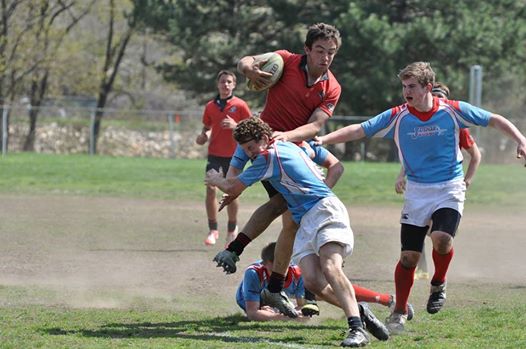
On May 3rd, after their final regular season rugby match, Gregory the Great Academy’s Highlanders knelt and sang the Non Nobis Domine, as every Highlander has for over two decades: the same red jersey, the familiar numbers on each back, but a different field, different dusty faces with heads bowed: Not unto us, O Lord, but to thy name give the glory.
Rugby has long occupied a central role in the education that the boys receive at Gregory the Great Academy. While high school boys need to run around, rugby has always been something much more than a cathartic pastime. It both reflects and unites the central virtues of our education.
There is a ritual to each rugby game. While it concludes with a hymn of praise, it begins with a Welsh war song, “Men of Harlech:”
See the glare of fires like hell there,
Tongues of flame that writhe and swell there.
Brave men strike with full-voiced yell there:
Forward with all might.
So framed in poetry and prayer, each match itself shares something of both its beginning and its end. Each well executed play finds that gap in the defensive line like the poet who finds that perfect word to complete his rhyme scheme. A moment of beautiful execution building to create the whole, a beautiful poem or a great game of rugby. Each tackle a grappling with fear, an act of virtuous courage offered Non nobis Domine, sed nomini tuo da gloriam.
The true Highlander, like any man who possess true manly virtue, is no brute bent on destruction, but a fiercely joyful soul at play, making an offering of his exquisite playfulness. The Highlanders will be playing their first post-season match on May 10th in Pittsburgh. May God’s guidance and your prayers support them in the contest.
by John Bascom, Assistant Coach
